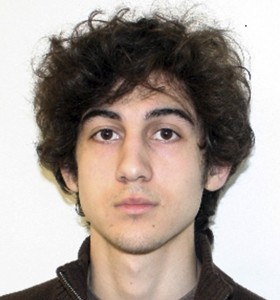
A former brother-in-law of Boston Marathon bomber Dzhokhar Tsarnaev testified Wednesday from Kazakhstan about the role of a conservative Muslim convert who steered Tsarnaev’s older brother toward a stricter version of Islam.
Elmirza Khozhugov, the former husband of Tsarnaev’s sister Ailina Tsarnaeva, testified on live video for the defense from Almaty, the largest city in Kazakhstan. The Tsarnaev family — ethnic Chechens — lived in the Dagestan region of Russia, near Chechnya, and in the former Soviet republic of Kyrgyzstan before moving to the U.S. in 2002, when Dzhokhar was 8.
A federal jury will soon decide whether Dzhokhar, now 21, should be executed or sentenced to life in prison for the 2013 bombings that killed three people and wounded more than 260.
The defense is trying to show that Dzhokhar was heavily influenced by his radicalized 26-year-old brother, Tamerlan, whom they call the mastermind of the plot. Tamerlan was killed days after the bombing during a getaway attempt.
Khozhugov said the Muslim convert named Misha often visited the Tsarnaev apartment in Cambridge, Massachusetts, to talk to Tamerlan about Islam.
“I wouldn’t call it formally a lesson, but he was teaching him and suggesting books to read … expressing his own views about that faith to Tamerlan,” Khozhugov said.
Khozhugov said one night, father Anzor Tsarnaev came home from work and wanted to take a shower. But mother Zubeidat stopped him because he would have to walk through the kitchen, where Misha was talking with Tamerlan.
“Anzor would say, ‘Why is he so late at night …. in my house?’ … She would say, ‘Don’t bother them. Misha is teaching your son good things,'” Khozhugov said.
He said Tamerlan told him he quit boxing, stopped taking acting classes, and stopped playing and listening to music after Misha said those things were not appropriate in Islam.
Khozhugov also described the close-knit relationship between the brothers. He said Tamerlan often couldn’t find the words to express how much he loved Dzhokhar and how he was willing to do anything to help Dzhokhar be successful in life.
Dzhokhar, in return, adored Tamerlan, Khozhugov said.
“He listened to Tamerlan. He went along any time Tamerlan would say, ‘Let’s go do this and that,'” Khozhugov said. “He would just go along and always find time to actually go along.”
Tsarnaev’s lawyers told the jury that the oldest brother in Chechen families traditionally takes on the role of decision maker if the father is incapacitated. A psychiatrist testified Tuesday that he diagnosed Anzor Tsarnaev with post-traumatic stress disorder in 2003 and that he also suffered from a variety of physical ailments.
“There is a saying we have in Chechnya. … ‘In a family with seven sons, it is better to be a dog than the younger son,'” Khozhugov said.
Dr. Jay Giedd, an expert in adolescent brain development, also testified for the defense Wednesday as Tsarnaev’s lawyers try to convince the jury that his age at the time of the bombings — 19 — is a mitigating factor.
Giedd said the part of the brain associated with impulse control and long-range planning can continue to develop until age 25 to 30.
“Teens are more likely to choose the smaller, sooner reward, less worried about longer-term consequences,” he said.
Giedd acknowledged that there are huge variations in brain development, with some teenagers being very future-thinking and some middle-aged people remaining impulsive.
“Many exceptions to the rules,” he said.
During cross-examination by prosecutor Nadine Pellegrini, Giedd acknowledged that children even younger than teenagers can understand consequences.
“Even under age 10, they can do quite well with planning and consequences,” he said.




